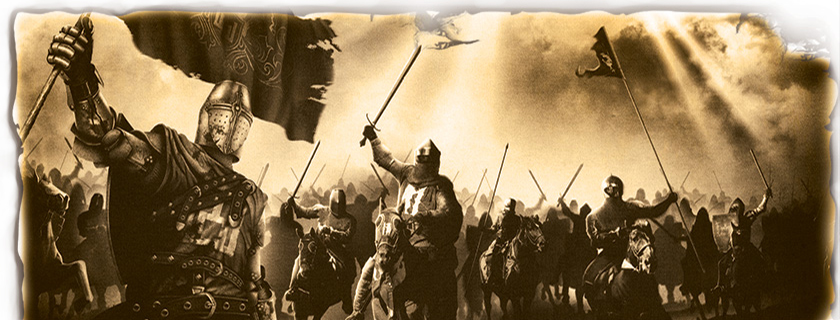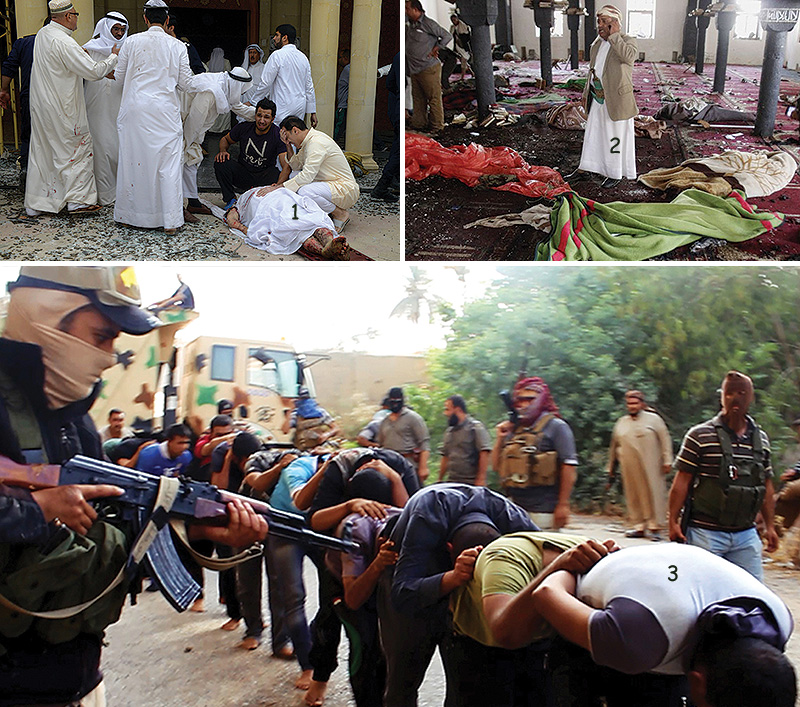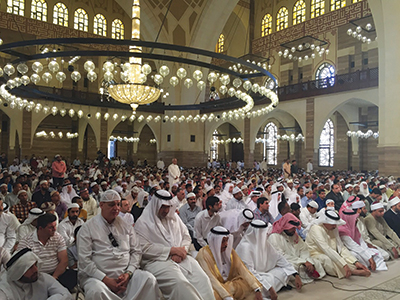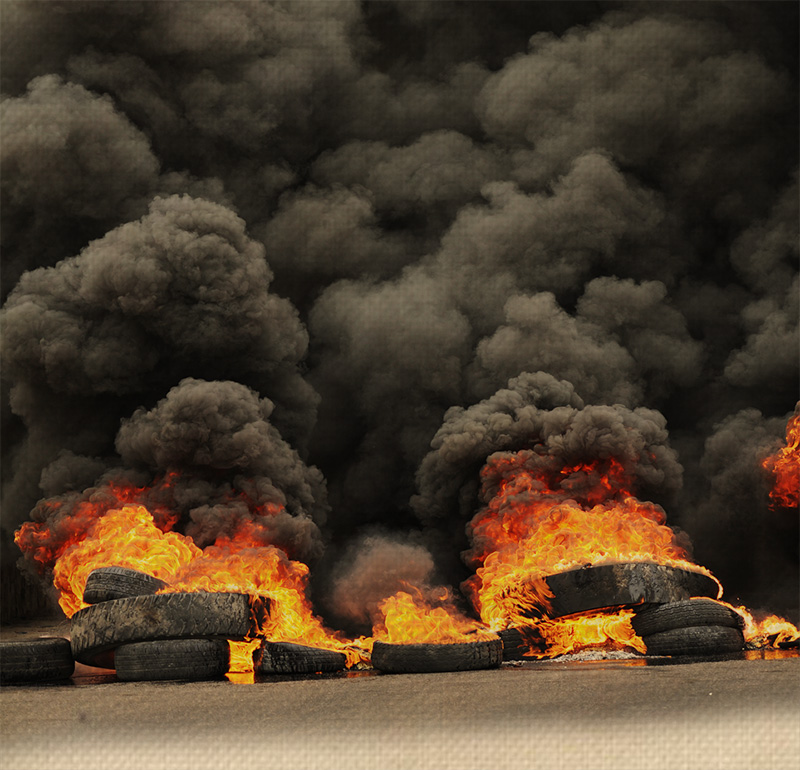Those who believe and do not mix up their belief with any wrongdoing,
they are the ones who are safe…
(Qur'an, 6:82)
 |
All these examples reveal that organising acts of terror against innocent people is utterly against Islam and no Muslim who takes as his guide the verses of the Qur'an and the practices of the Prophet Muhammad (pbuh) could ever commit such crime. On the contrary, Muslims are responsible for stopping these people, that is removing "mischief on earth" and bringing peace and security to all people all over the world.
It is not possible to talk about "Christian terror", "Jewish terror" or "Islamic terror". Indeed, an examination into the background of the perpetrators of these acts, regardless of their faith, reveal that the terrorism in question is not a religious but a social phenomenon.
As mentioned earlier, the true message of a religion or a system of belief can be at times distorted by its own pseudo-adherents. The Crusaders, whose period constitutes a dark episode in Christian history, are an example of this type of distortion.
The Crusaders were European Christians who undertook expeditions from the end of the 11th century onwards to recover the Holy Land (Palestine and the surrounding area) from the Muslims. They set out with a so-called religious goal, yet they laid waste to each acre of land they entered spreading fear wherever they went. They subjected civilians along their way to mass executions and plundered many villages and towns. Their conquest of Jerusalem, where Muslims, Jews and Christians lived under Islamic rule in peace, became the scene of immense bloodshed. They massacred all the Muslims and Jews in the city without mercy.
In the words of one historian, "They killed all the Saracens and the Turks they found... whether male of female."13 One of the Crusaders, Raymond of Aguiles, in his own eyes boasted of this violence:
Wonderful sights were to be seen. Some of our men (and this was more merciful) cut off the heads of their enemies; others shot them with arrows, so that they fell from the towers; others tortured them longer by casting them into the flames. Piles of heads, hands and feet were to be seen in the streets of the city. It was necessary to pick one's way over the bodies of men and horses. But these were small matters compared to what happened at the Temple of Solomon, a place where religious services are normally chanted ... in the Temple and porch of Solomon, men rode in blood up to their knees and bridle reins.14
In two days, the Crusader army killed some 40,000 Muslims in the barbaric ways just described.15
The Crusaders' barbarism was so excessive that, during the Fourth Crusade, they plundered Constantinople (present-day Istanbul), a Christian city, and stole the golden objects from the churches.
 |
Of course, all this barbarism was utterly against the essence of Christianity. Christianity, in the words of the Gospel, is a "message of love". In the Gospel according to Matthew, it is said that the Prophet Jesus (pbuh) said to his followers, "Love your enemies and pray for those who persecute you" (Matthew, 5:44). In the Gospel according to Luke, it is said that the Prophet Jesus (pbuh) said, "To him who strikes you on the cheek, offer the other also." (Luke, 6:29) In no part of the Gospels is there any reference to the legitimacy of violence; thus murdering innocent people is unimaginable. You can find the concept of "murdering the innocent" in the Bible; but only in the cruel King Herod's attempt to kill the Prophet Jesus (pbuh) while he was a baby.
If Christianity is a religion based on love that accommodates no violence, how did Christian Crusaders carry out some of the most violent acts in history? The major reason for this was that the Crusaders were mainly made up of ignorant people. These masses, who knew almost nothing about their religion, who had probably never read or even seen the Bible once in their lifetime, and who were for the most part completely unaware of the moral values of the Bible, were led into barbarism under the conditioning of Crusaders' slogans which presented this violence falsely as "God's Will". Employing this fraudulent method, many were encouraged to commit dreadful acts strictly forbidden by God.
It is worth mentioning that in that period, Eastern Christians – the people of Byzantium, for instance – who were culturally far ahead of Western Christians, espoused more humane values. Both before and after the Crusaders' conquests, Orthodox Christians managed to live together with Muslims. According to Terry Jones, the BBC commentator, with the withdrawal of the Crusaders from Middle East, "civilized life started again and members of the three monotheistic faiths returned to peaceful coexistence."16
The example of the Crusaders is indicative of a general phenomenon. The more the adherents of an ideology are uncivilised, intellectually underdeveloped and ignorant, the more likely they are to resort to violence. This also holds true for ideologies that have nothing to do with religion. All communist movements around the world are prone to violence. Yet the most savage and bloodthirsty of them were the Khmer Rouge in Cambodia. This was because they were the most ignorant.
In the same way ignorant people can carry every idea espousing violence to the point of madness, so they can also involve violence in the Divine religions, which are absolutely opposed to violence. As in the Christian and Jewish worlds, examples of this have also taken place in the Islamic world and are still taking place today.
It is essential to refer to the character of the Bedouins in the time of our Prophet (pbuh) in order to see the true face of those who commit terror in the name of religion:
 |
Christianity is a religion based on love, yet Crusaders carried out some of the most violent acts in history. These masses, who knew almost nothing about their religion, and who had probably never read the Bible once in their lifetime, were led into barbarism under the conditioning of slogans which presented this violence falsely as "God's Will". |
In the period of the Prophet Muhammad (pbuh), there existed two basic social structures in Arabia. City-dwellers and Bedouins (desert Arabs). A sophisticated culture prevailed in Arab towns. Commercial relations linked the towns to the outer world, which contributed to the formation of good manners among Arabs dwelling in cities. They had refined aesthetic values, enjoyed literature and especially poetry. Desert Arabs, on the other hand, were the nomad tribes living in the desert who had a very crude culture. Utterly unaware of arts and literature, most of them developed an unrefined character.
Islam was born and developed among the inhabitants of Mecca, the most important city of the peninsula. However, as Islam spread to the rest of the peninsula, all the tribes in Arabia embraced it. Among these tribes were also desert Arabs, who were somehow problematic: their cultural background prevented some of them from grasping the profundity and noble spirit of Islam. Of this God states the following in a verse:
 |
Bedouins were nomadic tribes of the desert at the time of the Prophet Muhammad (pbuh). Because of the harsh conditions in which they lived, they came to possess a hard and rough culture. |
The desert Arabs are the worst in disbelief and hypocrisy, and more fitted to be ignorant of the limits which God has sent down to His Messenger. But God is Knowing, Wise. (Qur'an, 9:97)
Some among the desert Arabs who were "worst in disbelief and hypocrisy" and prone to disobey God's commands, became a part of the Islamic community in the Prophet's (pbuh) time. But in subsequent periods, due to erroneous interpretations and attitudes, some of them have given rise to bodies incompatible with the moral values of Islam.
The sect called "Kharijites" that emerged among the Bedouins was an example. The most distinctive trait of this perverse sect (which was called "Kharijites", literally "those who leave", because they greatly deviated from Sunni practices), was their wild and fanatical nature. The "Kharijites", who had little understanding of the essence of Islam or of the virtues and the values of the Qur'an, waged war against all other Muslims basing this war on a few Qur'anic verses about which they made distorted interpretations. Furthermore, they carried out "acts of terrorism". Hazrat Ali (ra), who was one of the closest companions of the Prophet (pbuh) and was described as the "gate of the city of knowledge", was assassinated by a Kharijite.
In other words, just as the Crusaders distorted and misinterpreted Christianity as a teaching of brutality, some perverted groups emerging in the Islamic world misinterpreted Islam and resorted to brutality. What is common to these sects and the Crusaders was their ignorant, unrefined and uncultivated nature, lacking a true understanding of their religion. The violence they resorted to resulted from this lack of understanding, rather than from the religion they claimed to espouse. They didn't even know the basic sources of their religion and acted on the superstitious beliefs they invented.
It would be completely wrong to think that the Bedouin character was limited to that time and no longer exists. The presence of people with the same character today is notable. These people, who like nobody apart from themselves or the group to which they belong, and even seek to portray the use of violence against those who do not share their faith as a religious requirement, harbour numerous flaws of logic. Denouncing people as unbelievers and misinterpretation of retaliation in kind are examples of these:
In the Islamic world, some Muslims who believe in the same God, who accept the Prophet Muhammad (pbuh) as His messenger and the Qur'an as the true Book accuse one another of divorcing themselves from the faith and of infidelity and kill one another. The mass killings of Shias and the destruction of Shia mosques that have recently cropped up have drawn attention to a radical deviance in the Islamic world. The attacks of some Shia groups against Sunnis in some regions such as Iraq have also contributed to this picture: However, this sanguinary mindset is not limited to these radical organisations only nor it is a new ailment.
What is responsible for those Muslims being killed in Egypt only because they are Shias, or those murdered and dragged through the streets of Iraq only because they are Sunnis are the rulings, or fatwas, issued by some so-called scholars who claim to speak on behalf of Islam. These so-called scholars speak in their mosques or appear on TV channels and drag mostly ignorant people into such brutality with their fatwas. In the Middle East, this flawed concept of religion based on superstitions is seen in the fierce struggle between Shia and Sunni groups within the same country. Meanwhile they are also seen in sectarian wars between countries that are waged by means of proxy groups and organisations. Of course the violence perpetrated by these groups is wrong. But that mistake cannot be corrected without a return to the Qur'an, the essence of the faith.
This ruthless spirit of dissention considers shedding the blood of the innocent as an "act of worship", it refuses to grant the right to life for those who do not adhere to their own understanding of faith and it causes the spread of this sedition which incessantly sheds blood in the Islamic countries. One of the problems at the base of this deviant ideology is "takfir":
"Takfir" means declaring a person [or a group] an unbeliever (kafir), accusing him of divorcing himself from the faith of Islam. When the groups referred to as "takfiri" arrive at this verdict about a person or a group, they also declare it obligatory for these people to be killed in line with their bigoted un-Islamic understanding based on superstitions. However in the Qur'an, God does not grant any human being the right to reject or not accept one's adherence to Islam. On the other hand, even if a person swerves to irreligion after his faith his punishment is for God to decide.
 |
1. Kuwait (the Imam Ja'far as-Sadiq Mosque bombing) |
Some Muslims kill one another because they follow superstitions instead of the teachings of the Qur'an. Killing has no place in Islam. |
The judgment concerning anything you differ about is God's concern... (Qur'an, 42:10)
... God alone is qualified to judge. His order is to worship none but Him. That is in truth the straight and upright religion, but most of mankind simply do not know. (Qur'an, 12:40)
In our day, some Sunni groups declare Shias unbelievers while Shias declare Sunnis unbelievers. We see that they mention one another's name with hatred, that they do not pray together and in many regions they kill one another in a fierce struggle. The rationale of takfir that has entered into the religion of Islam has no place in the Qur'an; this sedition is based on a so-called hadith known as the "'al-Firqat al-Najiyah" (the Saved Sect) ascribed to our Prophet (pbuh). The most widely referred to part of this fabricated hadith – one that is part of various narrations but has no foundation in the verses of the Qur'an – is as follows:
This line of reasoning takes place in different narrations with various additions or deletions. For instance, in at-Tirmidhi there is no mentioning of "All of them in the Fire save one." In Hakim, this hadith is narrated very briefly saying, "My nation will be divided into some seventy sects; the largest one acts of its own accord and makes what is lawful unlawful, and makes that which is unlawful lawful." (Al-Mustadrak, 4/430)
 |
In our day, some Sunni groups declare Shias unbelievers while Shias declare Sunnis unbelievers. We see that they do not pray together. The rationale of takfir that has entered into the religion of Islam, however, has no place in the Qur'an. |
The disintegration and fragmentation we see in the Islamic world is the outcome of a mindset that does not find the Qur'an to be sufficient, and attempts bringing about a different form of Islam through superstitions, bigotry and fabricated hadiths and traditions. Instead of following the example of the Muslims at the time of our Prophet (pbuh), such bigoted and fanatical groups make up their own fabrications of what is lawful and unlawful and believe only in their own conjectures; they declare other Muslims who practice Islam in a different way to be apostates. However, God has precluded the grounds for such a mindset quite clearly in the Qur'an:
You who believe! When you go out to fight in the Way of God verify things carefully. Do not say, "You are not a believer, to someone who greets you as a Muslim, simply out of desire for the goods of this world. With God there is booty in abundance. That is the way you were before but God has been kind to you. … (Qur'an, 4:94)
In the hadiths, we see that our Prophet (pbuh) guided Muslims to shy away from accusing one another with disbelief:
... he who labelled anyone with unbelief or called him the enemy of God, and he was in fact not so, it rebounded on him. (Sahih Muslim, Book 1, Hadith 118)
... cursing a believer is like murdering him, and whoever accuses a believer of disbelief, then it is as if he had killed him." (Sahih Bukhari, Book 73, Hadith 126)
Whoever prays like us and faces our Qibla and eats our slaughtered animals is a Muslim and is under God's and His Apostle's protection. So do not betray God by betraying those who are in His protection. (Sahih Bukhari, Book 8, Hadith 386)
Any person who called his brother: O unbeliever (has in fact done an act by which this unbelief) would return to one of them. If it were so, as he asserted (then the unbelief of man was confirmed but if it was not true), then it returned to him (to the man who labelled it on his brother Muslim). (Sahih Muslim, Book 1, Hadith 117)
When a man calls his brother an unbeliever, it returns (at least) to one of them. (Sahih Muslim, Book 1, Hadith 116)
At the time of our Prophet (pbuh), there were hypocrites, those who did not have faith in their hearts and of course deviators: God has informed us in many verses in the Qur'an that there were people who were not pleased with the judgment of the Prophet (pbuh), who displayed abnormalities in their conduct and morals, and even some who were covertly in disbelief. However, our Prophet (pbuh) pursued communicating religion and made efforts to strengthen the faith of everyone without exception, and never indicted them for disbelief. It is not possible for a servant of God to judge any person regarding his faith or punish him on the basis of this.
 |
God informs us that Muslims' differing among themselves or being in dispute is an error that must be accounted for in the hereafter:
As for those who divide up their religion and form into sects, you have nothing whatsoever to do with them. Their affair will go back to God and then He will inform them about what they did. (Qur'an, 6:159)
In the Qur'an, we are informed that Muslims should be united, that they should live as brothers, that they must not separate and they must be friends and be in ranks like well-built walls and not quarrel:
Obey God and His Messenger and do not quarrel among yourselves lest you lose heart and your momentum disappear. And be steadfast. God is with the steadfast. (Qur'an, 8:46)
Do not be like those who split up and differed after the clear signs came to them. They will have a terrible punishment. (Qur'an, 3:105)
Instead of contributing to the unity of Muslims, those who make statements of separation and hatred or give fatwas declaring others to be in a state of disbelief incite Muslims to violence and bloodshed. Those who wage a so-called jihad against their fellow Muslims based on the pronouncements of their sect leaders are in grave error, which they will not be able to account for in the hereafter. God commands making peace between Muslims as follows:
The believers are brothers, so make peace between your brothers and have fear of God so that hopefully you will gain mercy. (Qur'an, 49:10)
 |
The commandments in the Qur'an are intended to eliminate the arbitrary punishments resulting from personal vengeance and grudges, a common occurrence in Arab society of the time of the Prophet Muhammad (pbuh). The principle of deterrence prevalent throughout the Qur'an is also visible in the commandment of "qisas" and protects life by preventing and eliminating crime:
"You who believe! Retaliation is prescribed for you in the case of people killed: free man for free man, slave for slave, female for female. But if someone is absolved by his brother, blood-money should be claimed with correctness and paid with good will. That is an easement and a mercy from your Lord. Anyone who goes beyond the limits after this will receive a painful punishment. (Qur'an, 2:178)
The noteworthy point about this verse concerning retaliation in kind is that it encourages forgiveness and pardoning, and says that these are better forms of behavior. In this sense, there is life in retaliation for us.
There are some requirements for retaliation as to the manner of its application – and by whom as well as to whom. In the Qur'an, God explains that the ones who are entitled to retaliation are the "next of kin":
Do not kill any person God has made inviolate, except with the right to do so. If someone is wrongly killed We have given authority to his next of kin. But he should not be excessive in taking life.... (Qur'an, 17:33)
In addition to that, as explained in the Qur'an 5/178, the said next of kin has the option to waive retaliation and ask for compensation, which is favouring forgiveness. In another verse, God explains that forgiving is preferable:
The repayment of a bad action is one equivalent to it. But if someone pardons and puts things right, his reward is with God. Certainly He does not love wrongdoers. (Qur'an, 42:40)
As is clear in the verses of the Qur'an, the best course of action is forgiving and improving. It is explained that this is a behaviour that God favoured even before Islam:
We prescribed for them in it [the Torah]: a life for a life, an eye for an eye, a nose for a nose, an ear for an ear, a tooth for a tooth, and retaliation for wounds. But if anyone forgoes that as a sadaqa, it will act as expiation for him. Those who do not judge by what God has sent down, such people are wrongdoers. (Qur'an, 5:45)
When the leaders of the terrorist organisations that abuse the religion of Islam, or the clergy that seek to legitimize them, are asked why they issue fatwas allowing such massacres and suicide bombings, they will say that it is in retaliation for attacks on Muslims. It is true that Muslims have been massacred in various parts of the world, wronged, oppressed and treated unfairly; nonetheless, God forbids responding to tyranny with tyranny. The way that forgiveness is recommended in the commandments concerning retaliation in kind is a reflection of this fact.
God forbids wickedness in the Qur'an. Furthermore, Islam states the principle of the "individuality of crime." Bombing people, attacking them regardless of them being innocent civilians, children, women or elderly is nothing but sheer murder. Likewise, killing people merely for the reason of their nationality, faith, or sect or taking revenge based on such reasons, is also completely against Islam. It does not comply with the Qur’an to perpetrate terror attacks on the innocent people of a country out of anger against the wrongdoings of that country’s government.
At the basis of the law of war in Islam is being just, and always aiming to establish peace, compromise and forgive. The goal is always ensuring the continuance of life for oneself as well as for others. For these reasons, the principle of "retaliation" that God allowed only as a deterrent principle against deliberate killing, and only through certain restrictions and conditions and over which forgiveness should be chosen, cannot be applied against individuals or societies based on personal thoughts of vengeance.
The commandments in the Qur'an are perfectly clear, but the existence of people who seek to perpetrate terror in the name of religion makes it essential to investigate the psychology of terror:
 |
For terrorists, killing people, wreaking destruction and havoc is a way of life. For them, bloodshed is a deliberate act. They can shoot innocents, throw a bomb at children or blow up a house without any feeling of compassion. |
The concept of terror has a wider meaning in today's language. Generally it refers to the armed conflict carried on by radical ideological groups. In general, terror means intimidation. But this intimidation encompasses a broad field including the whole lives of people who feel the intense threat of fear and violence. Terror includes intense and systematic intimidation designed to make people adopt a certain way of thinking and behaviour, as well as every kind of violent act carried out to produce this intimidation. But in every situation, the target of terrorism is directly or indirectly the citizens themselves.
Terror organisations use terror to rally support. The intimidation they use is calculated to increase their strength and so to gain the support of some or all the citizens.
The first thing that people think of when we mention the word "terror" is generally the kind known as "leftist terror", but there is also a kind of terror found in Third World countries and practiced by dictatorial regimes. Actually the reality here is nothing other than a massive implementation of leftist terror tactics. A dictator or a group in power is oppressive, using their power only for personal gain and for this reason they experience various kinds of social opposition. In this situation, the dictatorial regime always resorts to the same formula to show that it is stronger than the opposition; they inaugurate the use of terror so that citizens will be afraid and their own power is consolidated.
Terror organisations, on the other hand, in accordance with the ideologies they espouse, claim that their aim is to remove a government and its administrators which they regard as illegitimate and cruel and, in so doing, that they will reach their goal of establishing a happier and more just way of life. However, this is not a realistic claim. In the Qur'an, in the first verses of Surat al-Baqara, God issues this command to those who think in this way:
When they are told, "Do not cause corruption on the earth," they say, "We are only putting things right." No indeed! They are the corrupters, but they are not aware of it. (Qur'an, 2:11-12)
For terrorists, killing people is a way of life. They may shoot innocent people without pity and throw bombs at children. For them shedding blood is a pleasure. They have ceased to be human beings and turned into raving savage beasts. If there is anyone among them who shows the least feeling of compassion, they brand him as a coward or a traitor and demote him. Often they use their guns against one another and carry out bloody purges against internal factions in their own organisation.
Terrorism is nothing other than a totally diabolical source of bloodshed. Whoever supports this cycle of savagery is defending a satanic system. If a terrorist uses religious language and symbols, this must not deceive anyone. Terrorists who hide under the cloak of false religion are doubly guilty, both of the blood they have shed and for the anti-religious propaganda they have spread while committing these crimes in the name of religion.
Terror and religion are completely opposed to each other. Terrorism adopts the way of aggression, murder, conflict, cruelty and misery. But according to the Qur'an, all these things are kinds of oppression. God enjoins peace, harmony, goodwill and compromise. He forbids terror and every kind of act that does not promote peace, and, condemns those who commit such acts:
But as for those who break God's contract after it has been agreed and sever what God has commanded to be joined, and cause corruption in the earth, the curse will be upon them. They will have the Evil Abode. (Qur'an, 13:25)
The basic quality that terror and those who are infected by its cruelty have in common is that the fear and love of God is something completely alien to them. Their hearts have become hardened and they are spiritually ill.
The founder of Russian Anarchism, Michael Bakunin and his disciple Nechayev define an "ideal" terrorist in this way:
The whole work of his [a revolutionist's] existence, not only in words, but also in deeds, is at war with the existing order of society, and with the whole so-called civilized world, with its laws, morals and customs, he is an uncompromising opponent… He knows only one science; the science of destruction.17
 |
Terrorists see their destructive acts as a means of propaganda; they hope to spread fear by destroying people and property. |
As understood from these words of Bakunin and Nechayev, terrorists are people who sever their relationship with every material and spiritual institution thereby rejecting every moral value, and who view these institutions as impediments to their designs. Bakunin also said, "Day and night dare he [a revolutionist] have only one thought, one aim: the unmerciful destruction; while he, cold-blooded and without rest, follows that aim, he himself must be ready to die at any time and ready to kill with his own hands any one who seeks to thwart his aims." In his Ground-Work for the Social Revolution, there is this description of what kind of person a terrorist must be:
Stringent with himself he must also be to others. All weak sentiment towards relation, friendship, love and thankfulness must be suppressed through the only cold passion of the revolutionary work.18
These words lay bare the dark face of terrorism and show that it is completely opposed to the religion of Islam which is founded on peace, compassion and love.
The horrible terrorist attack on the Boston Marathon in the USA in 2013 was condemned by all true Muslims, just like 9/11 and other terrorist attacks were.
This terrorist act, in which three people lost their lives and hundreds were injured, was a savage act of misguided foolishness designed to set the Western and Islamic worlds against one another. Such ruthless acts have been used many times in different countries to try and give the West the impression that Islam is a faith that regards violence and terror as legitimate. Those acts have been successful in no small measure. As a matter of fact, in the wake of the Boston attack statements were made by some media organisations in the USA encouraging violence against Muslims and their isolation from society. There have always been such provocations and they will continue to happen. However, Muslims have a very important duty amidst this setting: not limiting themselves to condemning terrorist attacks and talking about the real Islamic morality to the entirety of humanity.
Whoever claims to be a Muslim and says that the faith advocates acts of terror or violence is either an agent provocateur claiming to be a Muslim, or someone who is wholly ignorant of the faith. Someone who says such things out of ignorance will mend his ways if told what the Qur'an truly says. People can only be properly informed about Islam if no credence is attached to provocation. If everyone knows that Islam views violence and hatred as unacceptable there will be no more issues for provocateurs or extremists to rage about.
 |
In the moral teaching of the Qur'an, to kill an innocent person is an act of immense cruelty. God forbids terrorist acts and condemns those who commit them. |
There are people trying to incite hostility toward Islam in the Christian and Jewish world, and there are also people trying to incite hostility toward Christianity and Judaism in the Islamic world. These people are bigoted fanatics who issue provocative statements based not on the Qur'an, but on hadiths they fabricate themselves. This is a very serious and a very real problem in the Islamic world, and we cannot simply dismiss it. All true Muslims are deeply uneasy at such people being regarded as members of the Islamic world and representatives of the faith because these people have nothing to do with the values espoused by Islam. They have deprived themselves of fine feelings such as love, affection and compassion. They are filled with hatred and rage, not only for members of other faiths, but also for most Muslims from different sects. They may hate someone they have never met solely because he belongs to a different group. This is a perverse and unacceptable perspective for Muslims.
Causing members of different faiths and/or ethnicities to fall out and inciting conflict among them has been a technique successfully employed by those wishing to spread war throughout the course of history. Yet this world is wide and fertile enough for everyone to live in happiness and peace and well-being. There is no real reason for conflict or resorting to violence. All the supposed reasons for war and conflict are hollow ruses.
It is much, much easier to live in peace and love than in conflict and war. For example, it is unacceptable for either Palestinians or Israelis to have to live behind walls in fear of bombs, rockets and other weapons. This plight of these two peoples, one descended from the Prophet Ishmael and the other from the Prophet Jacob (peace be upon them both), is a disgrace on all mankind.
Our hope is that people with radical views will ultimately fade away within the moderate, loving and respectful views held by rational people – historically, radical movements inevitably burn out or destroy themselves – but for that to happen it is absolutely essential for sensible people in the Islamic, Christian and Judaic worlds to act as one in a spirit of solidarity. An alliance of good people is essential. This alliance must be brought about, not solely between Muslims, but also with the People of the Book. Otherwise, neither terror nor acts of violence can ever be entirely overcome.
14. Gesta Francorum, (The Deeds of the Franks and the Other Pilgrims to Jerusalem), trans. Rosalind Hill, (London: 1962), p. 91.
15. August C. Krey, The First Crusade: The Accounts of Eye-Witnesses and Participants (Princeton & London: 1921), p. 261
16. August C. Krey, The First Crusade: The Accounts of Eye-Witnesses and Participants (Princeton & London: 1921), p. 262
17. Alan Ereira, David Wallace, Crusades: Terry Jones Tells the Dramatic Story of Battle for Holy Land, BBC World Wide Ltd., 1995
18. The Alarm Newspaper Article, "Bakunin's Ground-Work for the Social Revolution," 1885 Dec. 26, p. 8